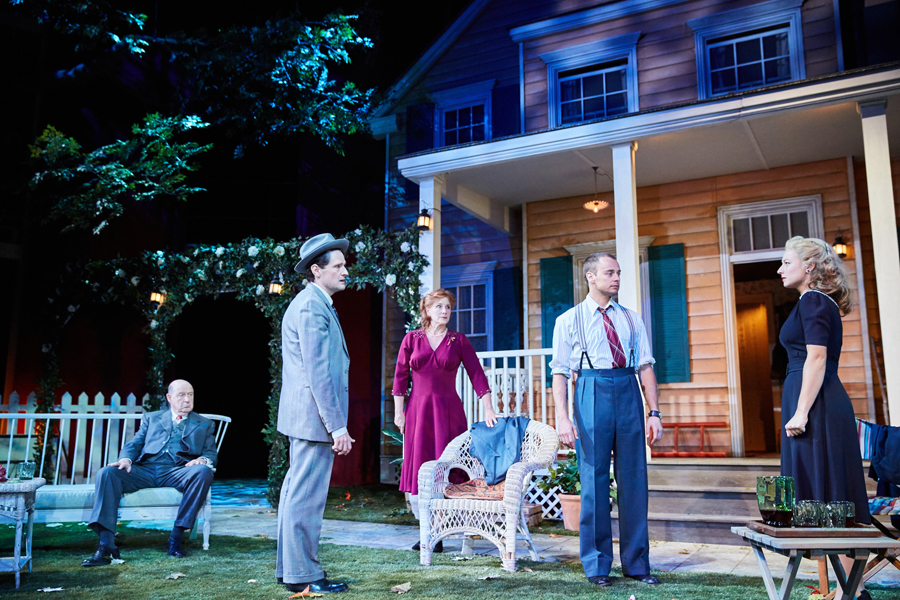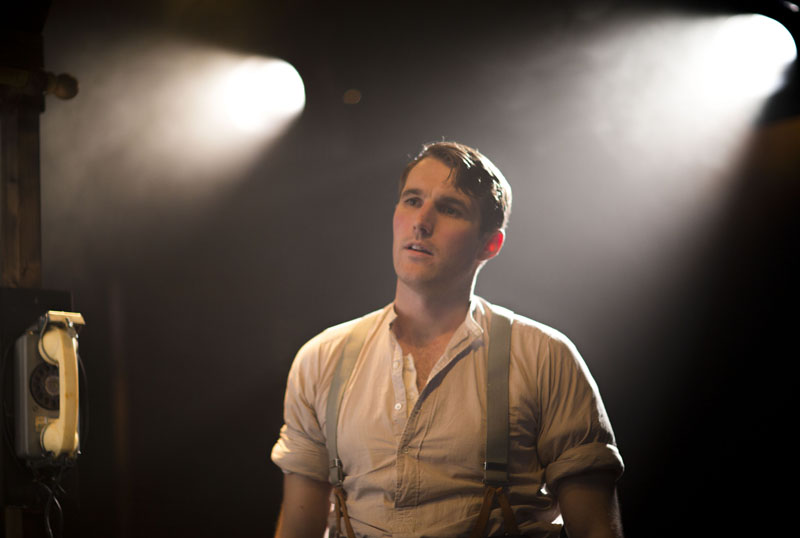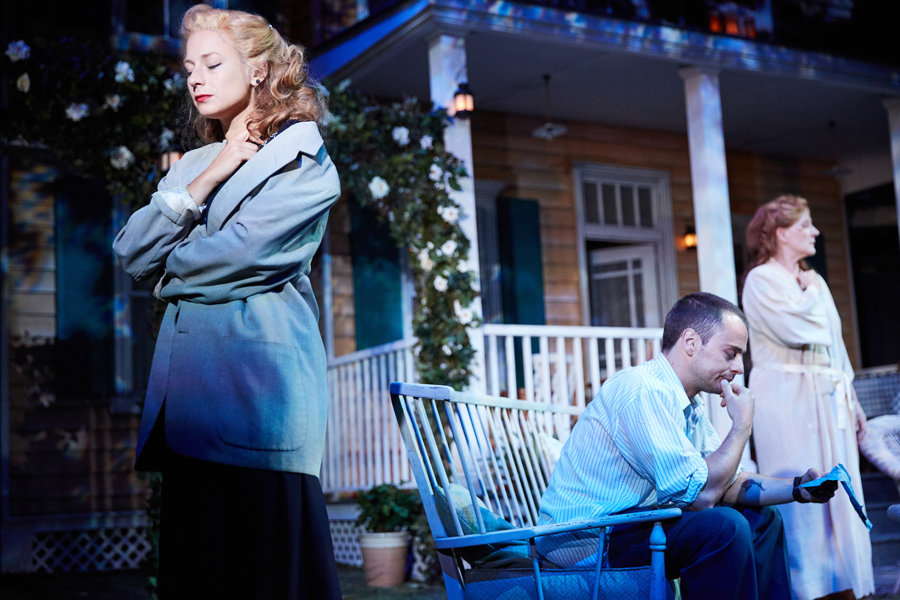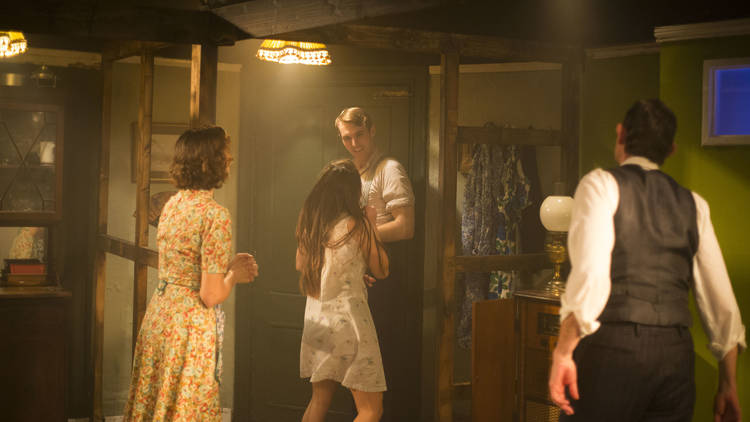The dark oppressiveness of 17th century Salem is conveyed the moment you step into the auditorium for the National Theatre’s revival of Arthur Miller’s classic play The Crucible. On all three sides of the Olivier’s stage, a curtain of water pours in a continuous, heavy stream. On and on it flows…
Interview: Patrick Marber
The American Clock ★★★★
It’s open season on Arthur Miller in the UK right now, as this second autobiographical play looking back to the legacy of the Great Depression joins The Price on the London stage, with All My Sons waiting in the wings to follow in April. It’s also a sign of the times that both the…
The Price ★★★★
Finishing the Picture ★★★★
Broken Glass ★★★★
Allons enfants de la Patrie! France during and after WWII provides fertile soil for rich drama, music and art this year
 What links London’s latest hit musical An American in Paris, a revival of Incident in Vichy – an Arthur Miller drama not seen in this country for 50 years – and the centenary of the young German artist Charlotte Salomon, who continues to enchant more than 70 years after she perished in the Holocaust?
What links London’s latest hit musical An American in Paris, a revival of Incident in Vichy – an Arthur Miller drama not seen in this country for 50 years – and the centenary of the young German artist Charlotte Salomon, who continues to enchant more than 70 years after she perished in the Holocaust?
The clue is in the titles of the theatre pieces. Arthur Miller's Incident in Vichy concerns the fate of 10 men detained in Vichy, France, at the height of World War II in 1942, when Vichy became notoriously synonymous with the French government of Marshal Pétain that collaborated with the Nazis. An American in Paris, freshly adapted from the much-loved Gershwin movie musical, is reimagined with a story set in the City of Light in 1945, in the immediate aftermath of the war. The heroine is a young Jewish ballerina safely hidden by Parisians, while her parents have disappeared in wartime Provence. And the young German artist Charlotte Salomon, escaping Nazi Germany to take refuge in the South of France, was herself arrested in Villefranche in September 1943 aged just 26 – within a month she had been murdered on arrival in Auschwitz.
Salomon was born 100 years ago this April and in the April edition of Jewish Renaissance, which will reach subscribers just before Passover, I explore the continuing allure of her life and work as expressed in the 765 autobiographical series of gouaches that make up her Life? Or Theatre?, in the company of the co-creators of a new play with music telling her story "in three dimensions".
I have just had the good fortune to marvel at the glorious evocation of the newly-liberated City of Light in American in Paris – a show that adds depth to the light-as-air story of the much-loved film musical without losing any of its charm and vitality, thanks to a fresh plot with Jewish protagonists at its heart. Find out more in my American in Paris review.
My most recent review is of an extraordinarily well-cast and tightly-directed revival of Arthur Miller's Incident at Vichy. The production successfully ratchets up the tension of Miller’s 90-minute morality play examining the different responses and fates of those 10 men picked off the streets of Vichy by a Nazi regime intent on rounding up Jews for deportation. It continues at London's Finborough Theatre until Saturday 22 April.
By Judi Herman
Click here to read all of our theatre reviews.
Review: Incident at Vichy ★★★★ – Rarely-performed Arthur Miller is 90 minutes of mounting tension in wartime France
Set in the detention room of a Vichy police station in 1942, Miller’s drama explores the ways paranoia among those detained by the Nazis could descend so easily into guilt and fear, making it all too easy for the perpetrators of the Holocaust. Ten men wait to be called. At first, the strained and nervous discussion is about why they might be there (a random pick up, routine check on their papers), but it soon emerges that some (or most) are Jews who have fled German-occupied northern France for the southern, ‘unoccupied’ Free Zone.
The play examines the various characters (some not even given a name: Gipsy, Waiter, Boy, Old Jew) and how they react to the increasingly frightening circumstances in which they find themselves. Some hope against hope that it will all turn out alright, even after communist railway worker Bayard (powerful Brendan O’Rourke) warns of cattle trucks full of people going to Poland to rumoured death camps. Others urge direct action, by the able-bodied at least. Are there ‘bad’ Germans and ‘passive’ Jews? In this classic morality play laying out the choices of good and evil between man and man and particularly within man himself, there are serial confrontations that reveal just how many points there can be on the so-called moral compass.
Previous, rare, productions of this Arthur Miller play suffered from trying to crank in dramatic action to beef up the morality statement, risking pre-empting the play’s climax, which does offer the promise of redemptive action (the ‘incident’). Here, director Phil Willmott makes the wise decision to let the words speak for themselves by focusing on designer Georgia de Grey’s white banquette within a white box that works brilliantly (literally) in the Finborough’s limited space. His superb line up of detainees are arranged on or around it in shifting poses as eloquent as Da Vinci’s Last Supper. Above them looms their eerie shadows, sharply-defined by Robbie Butler’s lighting.
From Lawrence Boothman’s painter, eyes eloquent with terror, to PK Taylor’s wonderfully infuriating actor, apparently in denial about his predicament; from Edward Killingback’s conscience-ridden Austrian nobleman (authentically tall and blonde) to Gethin Alderman’s French (Jewish) army doctor presenting Miller’s moral dilemma; this is a faultless and generous ensemble, perfectly cast to flesh out Miller’s selection of ‘types’ and to invest his rhetoric with humanity and pathos. And among the German captors, Timothy Harker, chillingly embodying the Nazi professor who revels in flushing out Jews, and Henry Wyrley-Birch’s conflicted Major, his war wound rendering him terrifyingly unpredictable, contribute to 90 minutes of almost unbearable tension.
The questions Miller poses are relevant today and this is an exceptional opportunity to see a rarely performed play in a production that Miller would surely have adored.
By Judi Herman
Photos by Scott Rylander
Incident at Vichy runs from Wednesday 7 – Sunday 25 June. 7pm (Tue-Sat only), 2.15pm (Sat & Sun only). £19.50-£25, £16 concs. King's Head Theatre, N1 1QN. 020 7226 8561. www.kingsheadtheatre.com
Click here to read more theatre reviews.
Review: All My Sons ★★★★ - Miller packs an emotional punch in Michael Rudman’s finely calibrated production
 How strangely Miller’s first great hit resonates with today, in ways no one could have predicted. This beautifully measured play opens with shots of laidback family life in a typical American small town where everyone knows one another. Comfortably-off factory owner Joe Keller’s backyard is a focal point, where he and the neighbouring doctor are reading the papers. “What’s today’s calamity?” jokes David Horovitch’s amiable Joe. Cue gales of ironic audience laughter, with the US election so raw.
How strangely Miller’s first great hit resonates with today, in ways no one could have predicted. This beautifully measured play opens with shots of laidback family life in a typical American small town where everyone knows one another. Comfortably-off factory owner Joe Keller’s backyard is a focal point, where he and the neighbouring doctor are reading the papers. “What’s today’s calamity?” jokes David Horovitch’s amiable Joe. Cue gales of ironic audience laughter, with the US election so raw.
For a play that unfolds like a Greek tragedy, it’s surprising how much laughter is built into these opening scenes. But that’s the point: drama, and especially tragedy, is an interruption of routine.
Director Michael Rudman worked extensively with Miller himself, notably directing an award-winning production of Death of a Salesman starring Dustin Hoffman. So Rudman brings a huge depth of insider knowledge, as well as a sure directorial instinct for the pace of the story and the complex relationships between its protagonists. There’s a terrific cast here too and designer Michael Taylor’s unusually realistic set – cosy front porch leading onto a verdant garden – works especially well too for a story that is all too authentic.
Keller is the father at the heart of Miller’s story, set in 1946. His younger son Larry is MIA in World War II and faulty aircraft parts manufactured in his factory caused the loss of other fathers’ sons. His deputy Steve Deever, who took the rap, remains in prison and although it’s known in the community that Joe is equally guilty, the Kellers’ lives seem unaffected on the surface. His wife Kate refuses to accept Larry is dead and his surviving son Chris wants to marry Larry’s girl Ann – daughter of Steve. And the Deevers used to live next door in what is now the doctor’s house, so those relationships are complex and uneasy indeed.
Horovitch’s Joe is all bluff heartiness, demanding to be liked and in pole position in both family and community, his guilt buried deep until events unravel. Penny Downie’s Kate is brittle in her bonhomie, steely in hope, her grief and guilt making her seem vulnerable, drifting almost wraith-like in long housecoats. Their relationship is clearly still physical. Like Claudius and Gertrude, they enjoy the fruits of a calamitous deceit and like the heroes of Greek tragedy they must be undone.
You can see why Francesca Zoutewelle’s enchanting Ann has fallen for Alex Waldmann’s intelligent Chris from the moment she skips into the yard like a breath of fresh air. He has a sense of humour and a conscience – a combination that would bode well for them as soulmates in any other circumstance. But Edward Harrison’s dark, angry George is an all too credible avenging fury.
Rudman told his cast: “Don’t sell the play to the audience. Make them come to you”. It’s a tactic that works wonderfully as the story reaches its tragic climax over the course of a day. Not simply a Greek tragedy, or an all-American one, but a human tragedy from one of America’s greatest Jewish playwrights given a production of which he would surely have approved.
by Judi Herman
Photos by Mark Douet
All My Sons runs until Saturday 19 November, 7.30pm matinees Thursday and Saturday 2.30pm, £8-£35, at Rose Theatre Kingston, 24 – 26 High St, KT1 1HL; 020 8174 0090. www.rosetheatrekingston.org
Review: No Villain ★★★★ – The world premiere of a vital addition to Arthur Miller’s canon of work – his very first play
 "My first attempt at a play, rather inevitably," Arthur Miller once wrote, "had been about industrial action and a father and his two sons, the most autobiographical work I would ever write."
"My first attempt at a play, rather inevitably," Arthur Miller once wrote, "had been about industrial action and a father and his two sons, the most autobiographical work I would ever write."
You may not have heard of Miller's play No Villain. It was his first, written when he was just 21, and submitted for the $250 Hopgood Award in drama at the University of Michigan, where he was studying in 1936. As the prize was worth about a quarter of the average family income at the time, it was extremely valuable to the Miller family, who had become impoverished during the Great Depression of the early-30s in the USA.
That you are reading about it now and can go and see it at London's Trafalgar Studios, is thanks to director Sean Turner, who worked doggedly to unearth this previously unpublished and unperformed play with the explicit aim of exploring the roots of Miller’s playwriting skills. So Turner has earned his place among Miller scholars for this invaluable insight into the development of one of America’s greatest playwrights. In this production, first seen at Islington’s Old Red Lion Theatre, he directs a close-knit cast in a way that lets Miller’s early voice shine through in all its youthful vigour, whatever the inevitable imperfections.
The plot is what would become familiar Miller territory, the family tensions between fathers and sons, here in a New York Jewish family, all bound up in a moral dilemma that explores the contradictions between soulless capitalism and the hopes and desires of the individual. In this self-avowedly autobiographical world, would-be communist Arny (a suitably chippy Alex Forsyth) comes home from University to find his father’s coat business on the point of collapse, precipitated by a recently-unionised workers’ strike that stops him shipping his output to customers. His struggling father Abe (David Bromley) and older brother Ben (George Turvey) urge Arny to help them save the business by getting out the orders, but Arny is trapped between loyalty to both his own family and a wider cause.
David Bromley’s Abe is full of the frustrations and tensions of a man whose business has already run down and is now finally collapsing. He is supported by that other Miller trope – his long-suffering wife – brought to life in a somewhat underwritten part by Nesba Crenshaw, with both actors capturing a real sense of time and place. George Turvey does sincere justice to the part of Ben, effectively Miller’s advocate, a good man who sees and tries to balance everything that life throws at him but finally accepts that that things fall apart and the centre cannot hold.
Helen Coles, Michael Lyle, Kenneth Jay and Stephen Omer brace the main characters with vivid character sketches in a variety of those supporting roles (kid sister, worker, grandfather born in the shtetl, rabbi, businessman, doctor…) we would now anticipate in a Miller play. Max Dorey’s small set evokes both the family home and the garment factory, where his realisation of those rails of white coats behind the action in the factory peoples the stage with an eerie chorus of extras, and he takes us from home to factory with a simple but effective switch. The lighting (Jack Weir), sound and original composition (Richard Melkonian), along with Natalie’s Pryce’s costumes, all help engender a real feel of 1930’s New York.
There’s plenty of recognisably Miller-style language, full of vivid, lyrical imagery and a heightened tone that still sounds real. Yet there’s a certain overall coolness in the delivery of Miller’s lines here that doesn’t quite capture the colour and humour of Jewish New York. In the end, it’s a play for Miller aficionados and theatre buffs who like to collect the rare. If you are one of these, it won’t disappoint. If you are not, it still gives a vital insight into the roots of one of the most important prolific and playwrights, not just in American theatre, but on the world stage.
By Judi Herman
No Villain runs until 9 July, 7.45pm & 3pm, £15-£30, at Trafalgar Studios, 14 Whitehall, SW1A 2DY; 0844 871 7632. www.atgtickets.com/venues/trafalgar-studios











